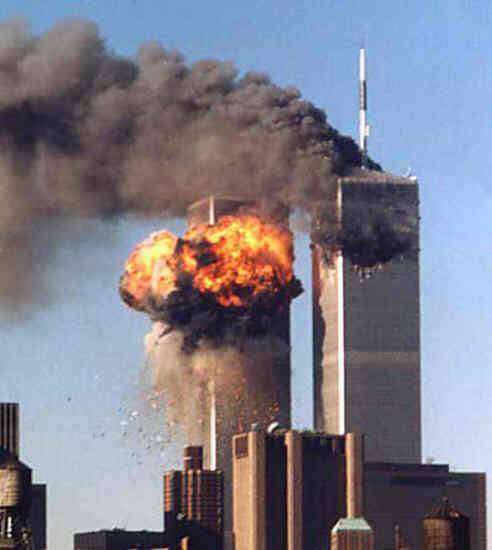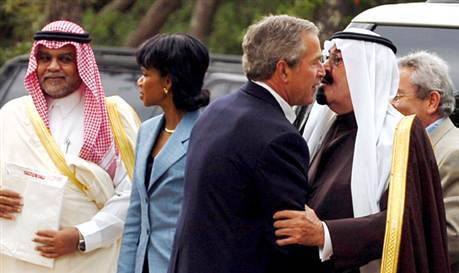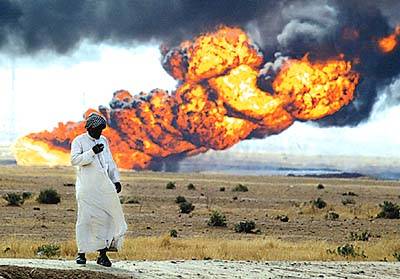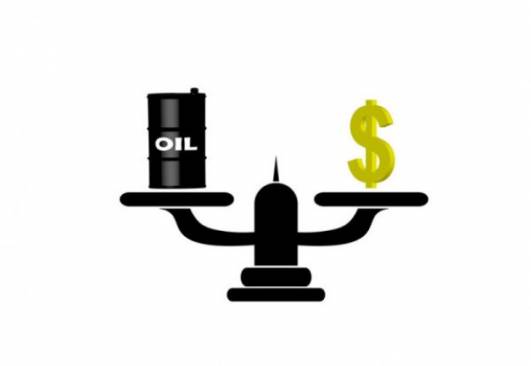The only reason war was waged in Iraq was because the Saudi royal family and oil companies affiliated with the Bush administration wanted to make sure we all kept paying $100 for a barrel of oil.
What's worse is that, in a kind of twisted way - we should all be grateful they did!
What was the war in Iraq all about?
Before I reveal all the real reasons for the war, I have to say that I hate answering questions like this.
I participated in a debate about the Iraq War at university, and despite winning - all I felt was frustration.
Frustration at the fact that people seem bored by hearing people 'bringing up the war in Iraq again', and frustrated that people can't see how the war in Iraq is still very relevant to economic and political policies today.
And I'm also frustrated by the fact that the real reason behind the war is so complex and outlandish - that whenever I try to discuss it, people inevitably assume I'm spouting some sort of X-Files conspiracy theory rhetoric.
In effect, the US administration (and its "coalition of the willing") have performed an act so abhorrent and illegal that it has actually had what I like to call the 'Mrs. Trunchbull effect'.

For those of you unfamiliar with the Roald Dahl story Matilda, Mrs. Trunchbull was an evil headmistress who abused the children of her school in such horrible ways that - even when the kids mustered up the courage to tell the truth about what had happened to them - their parents didn't believe them, because their tales sounded too insane to be true.
That's kind of what happened in Iraq. The motives behind the invasion of Iraq are so wacky that you kind of have to admire Bush and Co. For pulling it off!
9/11, Al Qaeda, Sadaam and Ozombie
The trickiest part of convincing people of the truth behind the Iraq war always hinges around 9/11.

Rather than avoid this issue, I'm going to try and tackle it first.
A scarily-large number of people still think we invaded Iraq to 'kick some terrorist butt'. Whilst they're right in thinking that 9/11 and Iraq are connected, what people struggle to understand is how.
Let me try and break it down:
Iraq had very little involvement with international terrorism until the Iraq war. None of the 9/11 hijackers were from Iraq, but 15 of them were from Saudi Arabia.
If you don't believe me, check out the Wikipedia page.
So, if you want to blame any particular country for 9/11, Saudia Arabia is the one to point the finger at.
Inconveniently, the Saudi Royal Family and the Saudi Ambassador to the US were great friends of George Bush at the time.
Here's a picture of them making out, in fact:

Why was Bush so close to the Saudis? And why was he picking on Iraq?
Simples. Iraq wasn't playing the game with the US and Saudi Arabia.
Bush and the American administration don't hate scary Middle Eastern men, they really like them and make business deals with them all the time.
What actually links Saudi Arabia, Bin Laden, and the US administration is a common goal: Maintaining stable oil prices.
Bin Laden was born into a very wealthy family, whose net-worth is thought to be in the range of $7.2 billion - not exactly the typical background for a terrorist mastermind.
What's even stranger is that many of the Bin Ladens lived in the US (although some had to be flown out of the country for their own safety after the 9/11 attacks).
Bin Laden was also married and divorced several times (which is frowned upon in Islam), and his family's religious devotion is not exactly 'pious' by anyone's standards.
This all makes for a very unlikely Islamist profile - why would a man whose own family don't practise Islam properly be so hell-bent on ridding the world of unbelievers, and spreading Islam?
The truth is that he wasn't. The whole Islam thing is a great way to get people riled up, a clever way to entice men who'd normally be sitting around in caves smoking weed and opium to pick up an AK-47.
It also provided the catalyst for the creation of an Islamophobic frenzy that would justify the killing of anyone who looked like Bin Laden.
These are the kind of scare tactics we were exposed to on Blu Ray and DVD:

Essentially, Bin Laden and his terrorist attacks gave the US permission to impose a sort of global Marshall Law - giving them carte blanche to take military action, even when the UN was completely against it.
Obviously, I can't say that the US directly organised or funded the attacks - but I would argue that they certainly had the power to influence Al Qaeda, and definitely knew about the organisation and its operations.
Why did Bin Laden get involved in 9/11, and what has that got to do with the war in Iraq?
So what actually motivated Bin Laden to start up Al Qaeda and mastermind the terror attacks that shocked the world?
I remember reading an article about Bin Laden back in 2008. What I read sent shivers down my spine:
Almost 20 years ago, a little known economist named Osama Bin Laden predicted that at $140 a barrel the market economy will collapse. Guess what: It did.
(Source:CuttingEdgeNews, Dec 2008)
And therein lies the real motivation behind 9/11, US involvement in Iraq, and the rise of Osama Bin Laden.
The US and the Saudis were afraid of fluctuating oil prices. When oil prices soared, this effectively sparked a chain reaction that led to the collapse of the housing market, and of the banks that financed it - the financial effects of which we are still feeling today!
But, back in 1998, when you could fill up your car for a fraction of today's pump prices - the $13 a barrel wasn't giving King Abdullah of Saudi Arabia and Exxon-Mobil, Halliburton and all the other US companies enough bang for their buck.
This is kind of strange, considering that the US and Saudi Arabia have indirect political control of the world body that governs oil production quotas: OPEC (Organization of the Petroleum Exporting Countries).
The official OPEC website defines the organisation as:
"an intergovernmental organization dedicated to stability in and shared control of the petroleum resources around the world".
So why wasn't it doing its job and stablising the world's oil production? Why did prices jump around from $13 a barrel to $140 a barrel?
The answer is this guy:

Iraq holds the world's largest oil reserves. In fact, there's so much oil in Iraq that the future of the world's energy supply probably depends on what's lurking in "that there Iraqi land".
This placed Sadaam Hussein in a unique bargaining position. He effectively controlled the world's economy.
In the 1980's, Bush and secretary of defence Rumsfeld tried to pal up with Hussein, in an attempt to make friends with the guy who controlled the tap.
When the relationship turned sour, America took military action (in Gulf War I), and also imposed sanctions on Iraq.
They honestly had no interest in weapons of mass destruction, or in how Sadaam was treating his population. Hafez Al Assad of Syria was also perpetrating massacres next-door, but no-one even batted an eyelid at that.
So anyone who argues that taking out Sadaam was some sort of humanitarian gesture can go tell that to the 40,000 people who were killed by Assad in one fell swoop, in Hama, Syria in Febuary 1982.
So what did the US want when they invaded Iraq?
Anyone who sees past the whole 'red, white and blue blowing up terrorists and fighting for democracy' facade will tell you that the US wanted oil. Blood for Oil is the slogan that campaigners use.

This isn't strictly accurate.
What the US wanted was to take control of the oil fields and keep the oil in the ground.
Sadaam's response to US sanctions and attacks on his oil fields in the first Gulf War was to ramp up oil production to make more money for himself and his country. He wasn't stopping oil production, he wanted to sell more!
Oil prices shot down, and US and Saudi oil companies became very concerned. Sadaam was effectively devaluing their product and ripping them off.

But, more than that, Sadaam was also a bit of an unpredictable nutcase. Having a guy like that sitting on oil reserves that could shatter the world's economic structure was making life uncertain for a whole lot of people - including you and me.
So, in a twisted way, we should be kind of grateful that calculating murderers intervened, and took control of oil production - as this has meant economic stability (and thus bread on the table) for a lot of people.
But what did they plan to do with the oil?
Not sell it.
That's right! If the US State Department wanted to privatise and sell off the Iraqi oil fields, it would have happened overnight.
Instead, what they wanted was to block privatisation deals, and make sure oil fields remained under the control of a corrupt and ineffective Iraqi government.
This would bring production to acceptably-low levels, encourage higher global oil prices, and ensure Iraq wasn't kicked out of Saudi-controlled OPEC for breaching production quotas.
The benefits of this were simple: Increased oil revenue for US and Saudi energy companies, and therefore a stabilisation of the economy as a whole.
Although the 125,000 dead Iraqis, the Iraqi population at large, and even the 2000 people who died in the World Trade Center might feel somewhat aggrieved - Sadaam came pretty close to dragging the world's economy into a state of chaos.
US intervention has meant that the global recession wasn't half as bad as it could have been.
This might seem an over-dramatisation, but all becomes clear when you get a sense of just how much oil Iraq actually has.
There is so much oil in Iraq that figures are actively being suppressed.
350 billion barrels of 'proven reserves' is one official figure, but even the Wikipedia page admits that 'instability' in the region means that these figures are based on "2-D seismic data from three decades ago".
I'm no economist, so I can't tell you what impact that amount of oil flooding into the market would have - but I'm pretty sure it wasn't a scenario that governments in the "coalition of the willing" were too keen on.






